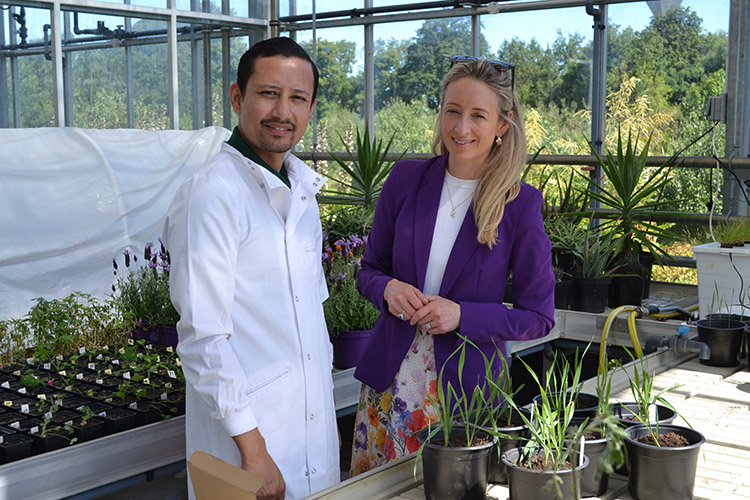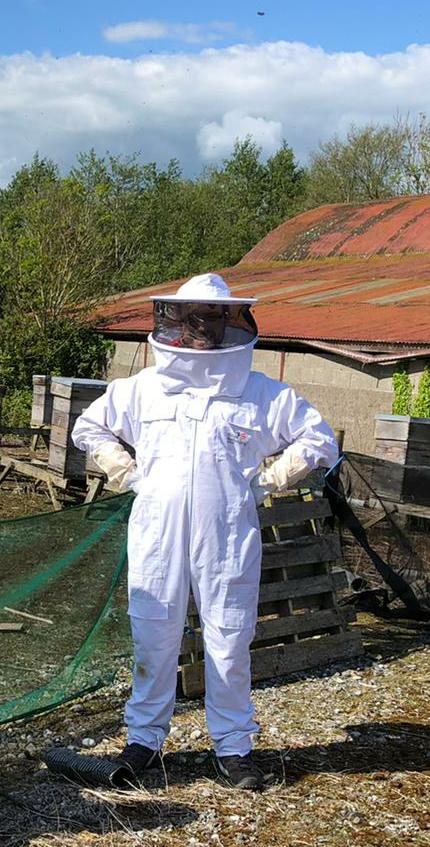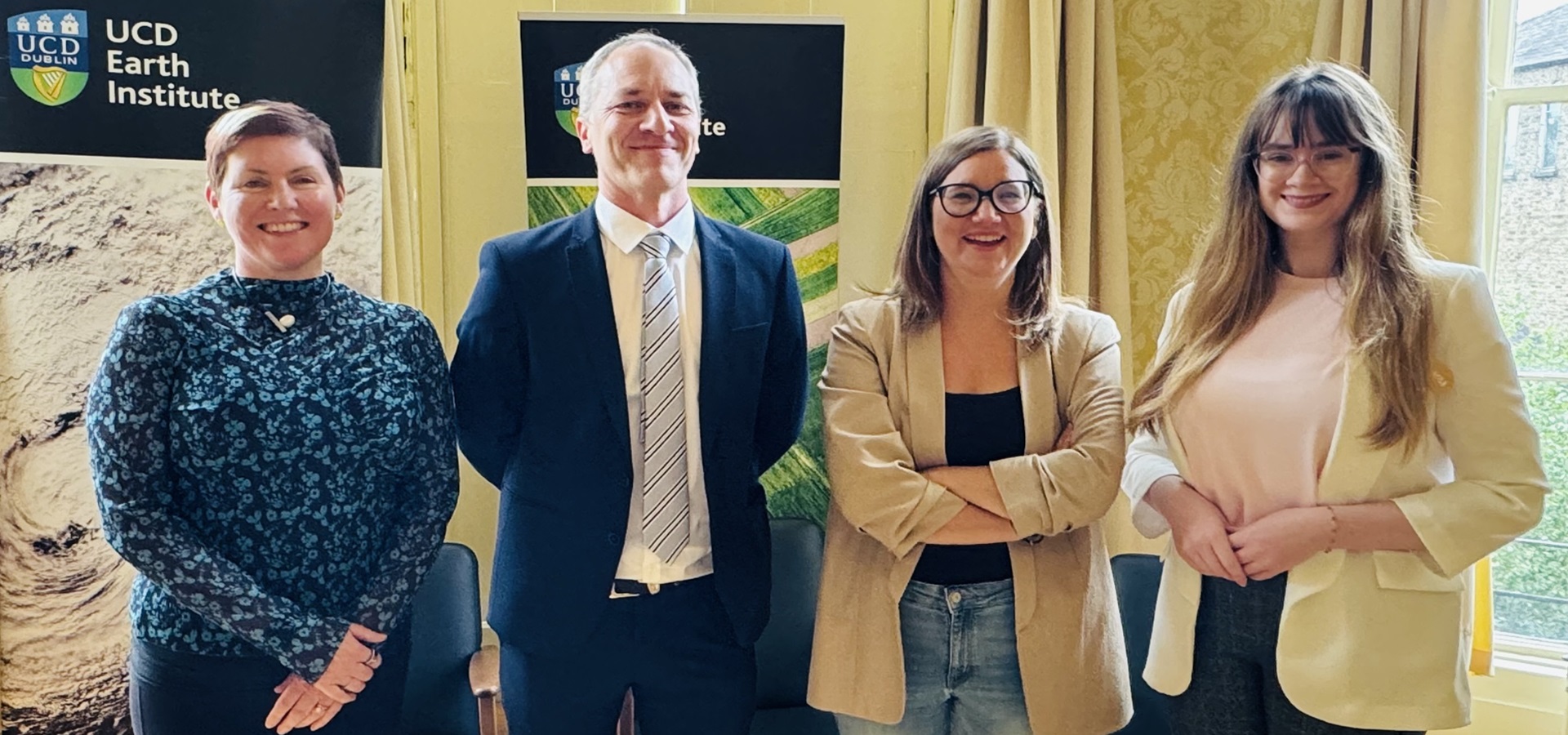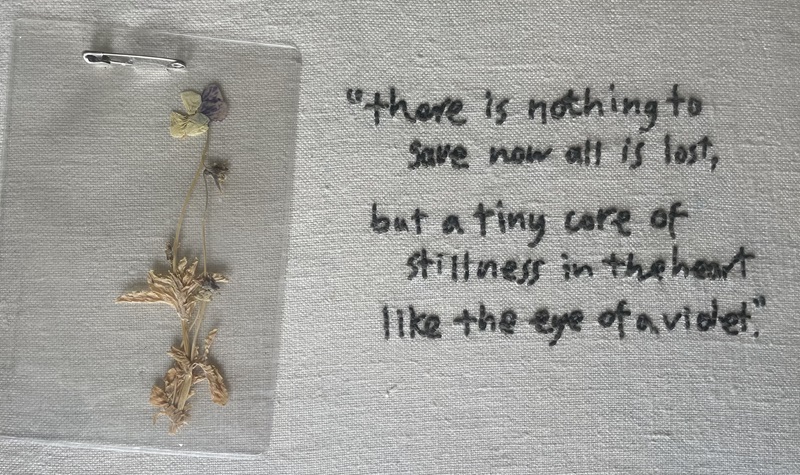Sujit Jung Karki and Darren O'Connell awarded SFI-IRC Pathway research funding

UCD awardee Dr Sujit Jung Karki with Dr Ruth Freeman, SFI, at UCD Rosemount Environmental Research Station Credit: Carl Gibney.
Eight UCD early career researchers including Earth Institute members Sujit Jung Karki (UCD School of Agriculture and Food Science) and Darren O'Connell (UCD School of Biology and Environmental Science) are among more than two dozen researchers receiving €14.6 million investment under the prestigious SFI-IRC Pathway programme.
 Sujit Jung Karki's project, "REVBY: Ramularia collo-cygni Effector Virulence in BarleY" focuses on studying the fungal pathogen Ramularia collo cygni (Rcc) and identifying its key protein, commonly called effectors which promote disease in barley plants.
Sujit Jung Karki's project, "REVBY: Ramularia collo-cygni Effector Virulence in BarleY" focuses on studying the fungal pathogen Ramularia collo cygni (Rcc) and identifying its key protein, commonly called effectors which promote disease in barley plants.
As Ireland's leading cereal crop, barley accounts for 70% of the 2.45 million tonnes of cereal produced annually. However, Ramularia Leaf Spot (RLS), caused by the fungus Rcc, poses a severe threat to barley production in Ireland and Europe, leading to yield losses of up to 1 tonne per hectare. Using a wide range of plant:microbe molecular biology techniques,we will identify the effector genes that play critical roles in virulence and disease progression. This research will be the first to elucidate the mechanisms by which Rcc colonizes barley, providing valuable insights into disease control strategies.
Sujit said, "I’m delighted to have been awarded the SFI-IRC Pathway fellowship for the project "REVBY" which will focus on disease control in one of the widely grown cereal crop, barley."
 Darren O'Connell's project "The genomics of adaptation in a hyper-diverse genus of bees: the past, present and future of important wild pollinators" will study one of the most diverse groups of pollinators with >1700 known species, the Andrena mining bees, using genomics to understand how they diversified so rapidly and how they adapt to the environment in a changing world.
Darren O'Connell's project "The genomics of adaptation in a hyper-diverse genus of bees: the past, present and future of important wild pollinators" will study one of the most diverse groups of pollinators with >1700 known species, the Andrena mining bees, using genomics to understand how they diversified so rapidly and how they adapt to the environment in a changing world.
A great mystery of science is why some animals can evolve and diversify quickly and some cannot. This is increasingly important in a changing world, as landscape and climate change has impacted many species. A particular worry is how this change will impact key species such as pollinators, which sustain the plants we depend on. Many wild pollinator species are tiny and poorly understood, such as the solitary bees. Genomics (analysis of all DNA in a species) is an emerging field which provides cutting-edge insight into species’ lives, such as how they have adapted and evolved, and provides ideal tool to study previously challenging species like solitary bees.
Darren O'Connell said, "I'm delighted to start this project which I hope will help to shed a light on this incredibly diverse and important, but little understood, group of wild pollinators."

Darren O'Connell in a beekeeper's outfit
UCD research projects awarded SFI-IRC Pathway funding
The eight UCD projects funded are:
- Dr Despina Bazou, UCD School of Biomolecular and Biomedical Science - 'Extramedullary disease in Multiple Myeloma: Finding new therapeutic targets by dissecting the cell heterogeneity with an integrated transcriptomic and proteomic analysis'.
- Dr Judith Evers, Ad Astra Fellow, UCD School of Veterinary Medicine - 'Closed-loop cortical stimulation for Parkinson's disease'.
- Dr Sean Kelly, UCD School of Biosystems and Food Engineering - 'PLAS-ME: Plasma for Agriculture Sustainability through Manure Enhancement'.
- Dr Darren O'Connell, UCD School of Biology and Environmental Science - 'The genomics of adaptation in a hyper-diverse genus of bees: the past, present and future of important wild pollinators'.
- Dr Qian Xu, UCD School of Medicine - 'A multi-therapeutic strategy for diabetic wound healing based on the injectable ECM-Mimetic hydrogel delivery of tailored ADSC-derived exosomes'.
- Dr Chinmoy Kundu, UCD School of Electrical and Electronics Engineering - 'Designing secure integrated sensing and communication systems for next-generation wireless networks (SECURE-ISAC)'.
- Dr Sujit Jung Karki, UCD School of Agriculture and Food Science - 'REVBY: Ramularia collo-cygni Effector Virulence in BarleY'.
- Dr XianXian Zhao, UCD School of Electrical and Electronics Engineering - 'Electromagnetic Transient Modelling and Stability Analysis of a Wind and PV Dominated Irish Power System for 2030 and Beyond'.
SFI-IRC Pathway programme
The SFI-IRC Pathway programme is a collaborative initiative between Science Foundation Ireland (SFI) and the Irish Research Council (IRC) to support early-career research across all disciplines and to encourage a cohesive research ecosystem in Ireland.
Minister for Further and Higher Education, Research, Innovation and Science, Patrick O’Donovan TD announced a €14.6 million investment in projects to support early career researchers under the SFI-IRC Pathway programme.
The 25 research projects, funded through 13 research bodies, have been awarded financial support covering a four-year period that will see their postdoctoral awardees transition into independent research leaders. The funding will also provide additional support for a postgraduate student who will be primarily supervised by the awardee.
Minister O’Donovan said: “This Pathway funding will help facilitate a defined journey from post-doctoral research to independent researcher. Bridging this gap is a challenging but critical milestone, and the research selected for investment will address key challenges and opportunities, ranging from new therapies for Parkinsons to the development of sustainable supercapacitors.”
Commenting on the awards, Dr Ruth Freeman, Director, Science for Society at Science Foundation Ireland, added: “[The SFI-IRC Pathway programme] provides targeted support to early-career researchers who will use the funding to pursue independent research at the frontiers of knowledge."
Further information
UCD early career researchers part of €14.6m SFI-IRC Pathway investment
UCD Research News: €14.6M invested to support early career researchers under the SFI-IRC Pathway programme

